Chinese censorship
- 格式:doc
- 大小:263.00 KB
- 文档页数:1
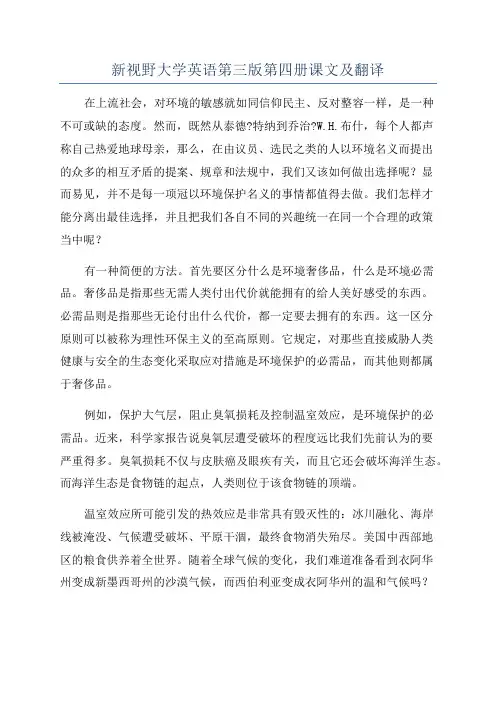
新视野大学英语第三版第四册课文及翻译在上流社会,对环境的敏感就如同信仰民主、反对整容一样,是一种不可或缺的态度。
然而,既然从泰德?特纳到乔治?W.H.布什,每个人都声称自己热爱地球母亲,那么,在由议员、选民之类的人以环境名义而提出的众多的相互矛盾的提案、规章和法规中,我们又该如何做出选择呢?显而易见,并不是每一项冠以环境保护名义的事情都值得去做。
我们怎样才能分离出最佳选择,并且把我们各自不同的兴趣统一在同一个合理的政策当中呢?有一种简便的方法。
首先要区分什么是环境奢侈品,什么是环境必需品。
奢侈品是指那些无需人类付出代价就能拥有的给人美好感受的东西。
必需品则是指那些无论付出什么代价,都一定要去拥有的东西。
这一区分原则可以被称为理性环保主义的至高原则。
它规定,对那些直接威胁人类健康与安全的生态变化采取应对措施是环境保护的必需品,而其他则都属于奢侈品。
例如,保护大气层,阻止臭氧损耗及控制温室效应,是环境保护的必需品。
近来,科学家报告说臭氧层遭受破坏的程度远比我们先前认为的要严重得多。
臭氧损耗不仅与皮肤癌及眼疾有关,而且它还会破坏海洋生态。
而海洋生态是食物链的起点,人类则位于该食物链的顶端。
温室效应所可能引发的热效应是非常具有毁灭性的:冰川融化、海岸线被淹没、气候遭受破坏、平原干涸,最终食物消失殆尽。
美国中西部地区的粮食供养着全世界。
随着全球气候的变化,我们难道准备看到衣阿华州变成新墨西哥州的沙漠气候,而西伯利亚变成衣阿华州的温和气候吗?Ozone depletion and the greenhouse effect are human disasters, and they are urgent because they directly threaten humanity and are not easily reversible. A sane environmentalism, the only kind of environmentalism that will strike a chord with the general public, begins by openly declaring that nature is here to serve human beings. A sane environmentalism is entirelya human focused regime: It calls upon humanity to preserve nature, but merely within the parameters of self-survival.当然,这种以人类为中心的主张与当下盛行的环保主义是格格不入的,后者已经沉溺于对地球的公然崇拜。
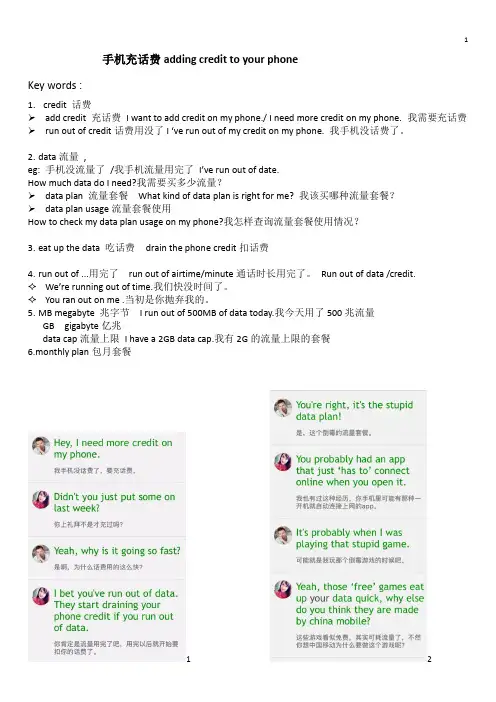
手机充话费adding credit to your phoneKey words :1.credit 话费add credit 充话费I want to add credit on my phone./ I need more credit on my phone. 我需要充话费 run out of credit话费用没了I ‘ve run out of my credit on my phone. 我手机没话费了。
2.data流量,eg: 手机没流量了/我手机流量用完了I’ve run out of date.How much data do I need?我需要买多少流量?data plan 流量套餐What kind of data plan is right for me? 我该买哪种流量套餐?data plan usage流量套餐使用How to check my data plan usage on my phone?我怎样查询流量套餐使用情况?3.eat up the data 吃话费drain the phone credit扣话费4.run out of ...用完了run out of airtime/minute通话时长用完了。
Run out of data /credit.✧We’re running out of time.我们快没时间了。
✧You ran out on me .当初是你抛弃我的。
5.MB megabyte 兆字节I run out of 500MB of data today.我今天用了500兆流量GB gigabyte亿兆data cap流量上限I have a 2GB data cap.我有2G的流量上限的套餐6.monthly plan包月套餐独生子女的苦与乐one childKey expressions:1.excessive interference 过度干涉2.the only child独生子女3.breack up with 和...分手4.Sort of . 差不多吧5. The one-child policy一胎政策6. Family planning 计划生育7. You’re the apple of your family’s yes.你是全家的掌上明珠。
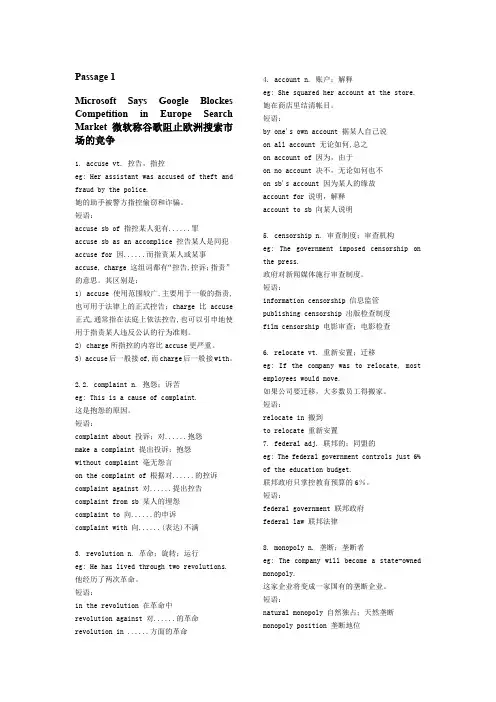
Passage 1Microsoft Says Google Blockes Competition in Europe Search Market微软称谷歌阻止欧洲搜索市场的竞争1. accuse vt. 控告,指控eg: Her assistant was accused of theft and fraud by the police.她的助手被警方指控偷窃和诈骗。
短语:accuse sb of 指控某人犯有......罪accuse sb as an accomplice 控告某人是同犯accuse for 因......而指责某人或某事accuse, charge 这组词都有“控告,控诉;指责”的意思。
其区别是:1) accuse 使用范围较广,主要用于一般的指责,也可用于法律上的正式控告;charge 比 accuse 正式,通常指在法庭上依法控告,也可以引申地使用于指责某人违反公认的行为准则。
2) charge所指控的内容比accuse更严重。
3) accuse后一般接of,而charge后一般接with。
2.2. complaint n. 抱怨;诉苦eg: This is a cause of complaint.这是抱怨的原因。
短语:complaint about 投诉;对......抱怨make a complaint 提出投诉;抱怨without complaint 毫无怨言on the complaint of 根据对......的控诉complaint against 对......提出控告complaint from sb 某人的埋怨complaint to 向......的申诉complaint with 向......(表达)不满3. revolution n. 革命;旋转;运行eg: He has lived through two revolutions. 他经历了两次革命。

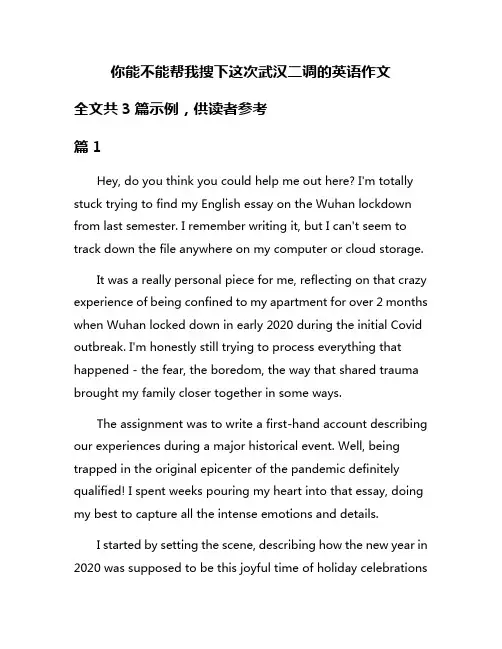
你能不能帮我搜下这次武汉二调的英语作文全文共3篇示例,供读者参考篇1Hey, do you think you could help me out here? I'm totally stuck trying to find my English essay on the Wuhan lockdown from last semester. I remember writing it, but I can't seem to track down the file anywhere on my computer or cloud storage.It was a really personal piece for me, reflecting on that crazy experience of being confined to my apartment for over 2 months when Wuhan locked down in early 2020 during the initial Covid outbreak. I'm honestly still trying to process everything that happened - the fear, the boredom, the way that shared trauma brought my family closer together in some ways.The assignment was to write a first-hand account describing our experiences during a major historical event. Well, being trapped in the original epicenter of the pandemic definitely qualified! I spent weeks pouring my heart into that essay, doing my best to capture all the intense emotions and details.I started by setting the scene, describing how the new year in 2020 was supposed to be this joyful time of holiday celebrationsand family gatherings. But then that mysterious new virus started spreading, and Wuhan became a ghost town filled with hazy fearsand uncertainties. From one day to the next, everything changed so abruptly.I vividly remember the confusion and anxiety in those early days. Conflicting rumors swirled as we tried to piece together what was happening based on scraps of information. Was this just a bad flu, or something far more sinister? Should we be stockpiling supplies? Why were they building those massive quarantine centers? The not-knowing was almost as scary as the virus itself.Then came the day we'd been dreading - January 23rd, when Wuhan went into full lockdown. Suddenly we were sealed inside our apartment complex, with rules about only one household member being allowed to go outside for necessities every few days. The usually bustling streets emptied out completely. Watching the deserted roads and highways was eerily apocalyptic.For a teenager篇2Hey, can you help me out with something? I have this English composition due soon on the "Wuhan Lockdown" from early 2020, and I'm really struggling to find good source material to write about it. I've tried googling and searching the school library databases, but I'm just not coming up with much beyond some basic news articles. This was such a major historical event though, so I feel like there has to be more in-depth analysis and first-hand accounts out there somewhere.I really want to do this topic justice and write a solid paper, because it was such an unprecedented and extraordinary situation. Just thinking about what the people of Wuhan went through during those 76 days of total lockdown ismind-boggling. Can you even imagine being confined to your home for over 2 months, with military personnel enforcing the rules and barricading the streets? Having to rely on neighborhood committees just to get basic supplies of food and medicine? The logistics of shutting down a city of 11 million people must have been nightmarish.From what I've read so far, it seems like the lockdown drove some people to emotional breaking points and acts of desperation, but also brought out incredible resilience, courage and community spirit in others. I'd love to find some personalnarratives or psychological analyses exploring the mental and emotional toll in more depth. How did people cope with that extreme isolation and loss of freedom for so long? What about those who were separated from family or stuck living alone? Or the many who lost loved ones to the virus but couldn't even properly mourn them?It's also just wild to me how quickly and decisively the Chinese authorities were able to implement such a draconian lockdown over a city that huge. I have to imagine there was a lot of confusion, skepticism and pushback from residents at first before people understood the gravity of the situation. I'm really curious to learn more about that process of steadily ramping up restrictions until they reached that final stage of total lockdown. Did they intially aim for something less extreme before realizing it wouldn't be enough? What roles did factors like lack of transparency and the Chinese censorship play?I think the legacy and long-term effects are also really fascinating to consider. The economic toll on Wuhan must have been catastrophic with businesses shut down for months and disrupted supply chains. Are there estimations of the financial costs? How long did it take the city to realistically recover and return to normal activity levels? Were there any permanentimpacts on industries, housing prices, etc.? I've also read some analyses arguing the lockdown may have permanently eroded trust in the Chinese government for many citizens. I'd be really interested to learn more about those kinds of political and cultural aftershocks.Then of course there's the global context to examine as well. The lockdown was unprecedented at the time, but sadly multiple other regions ended up implementing similar policies in the following months as COVID-19 spread into a pandemic. Did any of those subsequent lockdowns draw lessons or take policy approaches from how Wuhan unfolded, either in terms of what to do or what failures to avoid? More broadly, I think the Wuhan lockdown was a sign of how quickly and extremely human behavior and our whole way of living could be disrupted by a crisis like this. It was really a wake-up call about our vulnerability as a society to pandemics in an interconnected world.So yeah, those are just some of the aspects I'm hoping to focus on and some of the questions I'd love to explore more deeply for this paper. The first-hand experiences, the psychology of quarantine, the logistics and decision-making processes, the social and economic impacts, the global context and legacy. Do you have any suggestions for finding richer source materialsbeyond just news reports? Maybe academic articles, retrospective analyses, oral histories, documentaries, or anything that could give me a more comprehensive and nuanced understanding? I want to make sure I have a reallywell-researched paper that examines this hugely significant event from multiple angles. Let me know if you have any leads that could help!篇3Hey, can you help me out with something? You know that big English composition we had to write about the Wuhan remobilization for Mr. Wang's class? I totally spaced on doing it this weekend and it's due tomorrow morning first period. I'm really stressing out here!I normally don't ask for help like this, but I was so busy with basketball practice, my part-time job at the convenience store, and trying to spend a little time with Xiaoming. We've been going out for a couple months now and things are getting pretty serious between us. Anyway, I just didn't have any time left to work on that stupid essay.Mr. Wang made it sound so boring too - he wanted us to analyze the economic and social impacts of the Wuhanremobilization efforts and how they fit into the overall national revitalization strategy. Who cares about all that government policy stuff? I just want to graduate, get a decent job, and enjoy living my life without all these annoying assignments.But if I blow this off, Mr. Wang will probably fail me and then I'm stuck in his class again next semester. My parents will kill me if that happens. They're already mad that my grades have slipped a little this year with juggling so many activities. I can hear my dad's lecture now about how I need to straighten up and fly right to have a respectable future.So that's why I need your help. You're always on top of things with your assignments and know all the details about whatever we're studying. Mr. Wang did give us some background materials to work from, but I'm sure I misplaced them somewhere. It would take me forever just to track those down and try making sense of it all with the late start I'm getting.What I'm hoping is that you can shoot me a copy of the composition you've already written or at least an outline of how you planned it out. That would give me a base to work from so I'm not starting from nothing. I'll reword and reorganize it some to make it my own work, but just getting a blueprint from you would be a huge help.I really owe you one if you can come through on this! We could grab a bite together after class and I'll cover your meal to say thanks. Or if you need any other homework or exam help later on, I've got your back returning the favor. Just let me know what you need.My backup plan is to try faking one of those coughing fits I'm kind of famous for in the middle of class. Then I can say I'm too sick to turn in the assignment and buy myself a little more time. But Mr. Wang's been on to that trick lately, so I'd rather not go there if I can get this squared away ahead of time.Saving my butt over this Wuhan remobilization essay would be such a relief! Like I said, I don't make a habit of asking for cheats or handouts. I've just got way too much on my plate right now and something had to give temporarily. As soon as this assignment is out of the way, I'll get back on track and refocused. Dreams of universities and careers are still dancing in my head, so don't worry about enabling bad habits here - I know I need to get my act together overall.Anyway, that's the situation I'm in. Anything you can do to help out would be a total lifesaver! Just slip me your notes or draft when you can. I'll be soooo grateful and get Mr. Wang's stupid essay turned in on time. Keeping my parents calm andgiving myself a chance at a passing grade - that's really all I'm asking for right now. Let me know if you can help a friend out! Thanks so much!。
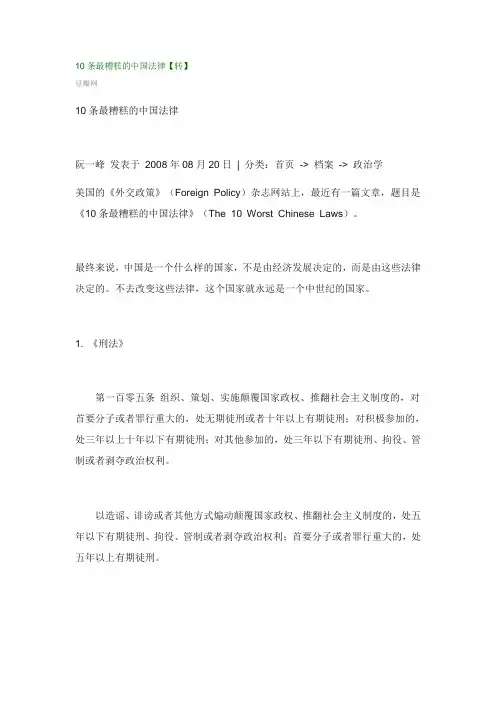
10条最糟糕的中国法律【转】豆瓣网10条最糟糕的中国法律阮一峰发表于2008年08月20日| 分类:首页-> 档案-> 政治学美国的《外交政策》(Foreign Policy)杂志网站上,最近有一篇文章,题目是《10条最糟糕的中国法律》(The 10 Worst Chinese Laws)。
最终来说,中国是一个什么样的国家,不是由经济发展决定的,而是由这些法律决定的。
不去改变这些法律,这个国家就永远是一个中世纪的国家。
1. 《刑法》第一百零五条组织、策划、实施颠覆国家政权、推翻社会主义制度的,对首要分子或者罪行重大的,处无期徒刑或者十年以上有期徒刑;对积极参加的,处三年以上十年以下有期徒刑;对其他参加的,处三年以下有期徒刑、拘役、管制或者剥夺政治权利。
以造谣、诽谤或者其他方式煽动颠覆国家政权、推翻社会主义制度的,处五年以下有期徒刑、拘役、管制或者剥夺政治权利;首要分子或者罪行重大的,处五年以上有期徒刑。
虽然中华人民共和国《宪法》第35条规定,公民有言论自由。
但是,由于《刑法》第105条的规定,使得政府可以合法地压制所有的批评。
许多批评政府的人,最终都被以颠覆罪起诉。
2. 《中华人民共和国户口登记条例》第六条公民应当在经常居住的地方登记为常住人口,一个公民只能在一个地方登记为常住人口。
户口制度采用居住地将公民分类,人为制造不同的社会经济等级。
除非满足某些条件,农村户口不得转为城镇户口。
如果没有当地户口,外来人口就很难享受居住地的医疗待遇,以及难以顺利解决子女教育问题。
3. 《互联网信息服务管理办法》(国务院292号令)第四条国家对经营性互联网信息服务实行许可制度;对非经营性互联网信息服务实行备案制度。
未取得许可或者未履行备案手续的,不得从事互联网信息服务。
第九条从事互联网信息服务,拟开办电子公告服务的,应当在申请经营性互联网信息服务许可或者办理非经营性互联网信息服务备案时,按照国家有关规定提出专项申请或者专项备案。
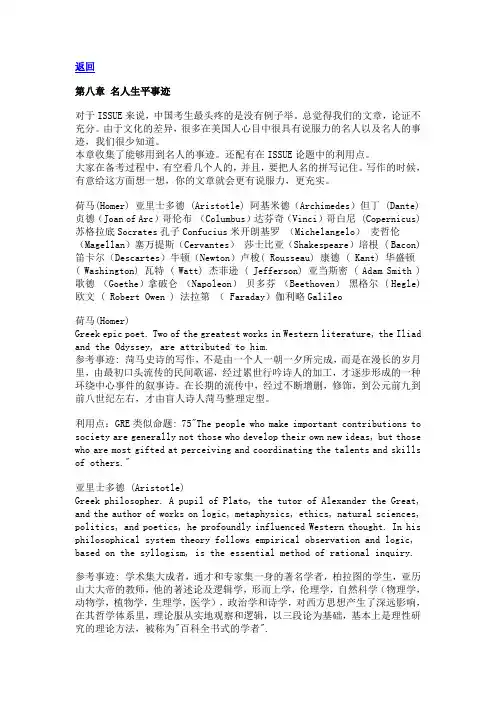
返回第八章名人生平事迹对于ISSUE来说,中国考生最头疼的是没有例子举。
总觉得我们的文章,论证不充分。
由于文化的差异,很多在美国人心目中很具有说服力的名人以及名人的事迹,我们很少知道。
本章收集了能够用到名人的事迹。
还配有在ISSUE论题中的利用点。
大家在备考过程中,有空看几个人的,并且,要把人名的拼写记住。
写作的时候,有意给这方面想一想,你的文章就会更有说服力,更充实。
荷马(Homer) 亚里士多德 (Aristotle) 阿基米德(Archimedes)但丁 (Dante) 贞德(Joan of Arc)哥伦布(Columbus)达芬奇(Vinci)哥白尼 (Copernicus) 苏格拉底Socrates孔子Confucius米开朗基罗(Michelangelo)麦哲伦(Magellan)塞万提斯(Cervantes)莎士比亚(Shakespeare)培根 ( Bacon) 笛卡尔(Descartes)牛顿(Newton)卢梭( Rousseau) 康德 ( Kant) 华盛顿( Washington) 瓦特 ( Watt) 杰菲逊 ( Jefferson) 亚当斯密 ( Adam Smith ) 歌德(Goethe)拿破仑(Napoleon)贝多芬(Beethoven)黑格尔 ( Hegle) 欧文 ( Robert Owen ) 法拉第( Faraday)伽利略Galileo荷马(Homer)Greek epic poet. Two of the greatest works in Western literature, the Iliad and the Odyssey, are attributed to him.参考事迹: 菏马史诗的写作,不是由一个人一朝一夕所完成,而是在漫长的岁月里,由最初口头流传的民间歌谣,经过累世行吟诗人的加工,才逐步形成的一种环绕中心事件的叙事诗。
在长期的流传中,经过不断增删,修饰,到公元前九到前八世纪左右,才由盲人诗人菏马整理定型。
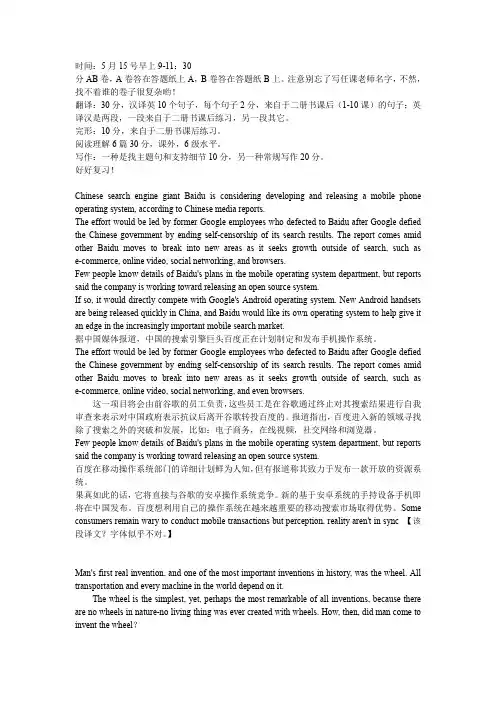
时间:5月15号早上9-11:30分AB卷,A卷答在答题纸上A,B卷答在答题纸B上。
注意别忘了写任课老师名字,不然,找不着谁的卷子很复杂哟!翻译:30分,汉译英10个句子,每个句子2分,来自于二册书课后(1-10课)的句子;英译汉是两段,一段来自于二册书课后练习,另一段其它。
完形:10分,来自于二册书课后练习。
阅读理解6篇30分,课外,6级水平。
写作:一种是找主题句和支持细节10分,另一种常规写作20分。
好好复习!Chinese search engine giant Baidu is considering developing and releasing a mobile phone operating system, according to Chinese media reports.The effort would be led by former Google employees who defected to Baidu after Google defied the Chinese government by ending self-censorship of its search results. The report comes amid other Baidu moves to break into new areas as it seeks growth outside of search, such as e-commerce, online video, social networking, and browsers.Few people know details of Baidu's plans in the mobile operating system department, but reports said the company is working toward releasing an open source system.If so, it would directly compete with Google's Android operating system. New Android handsets are being released quickly in China, and Baidu would like its own operating system to help give it an edge in the increasingly important mobile search market.据中国媒体报道,中国的搜索引擎巨头百度正在计划制定和发布手机操作系统。
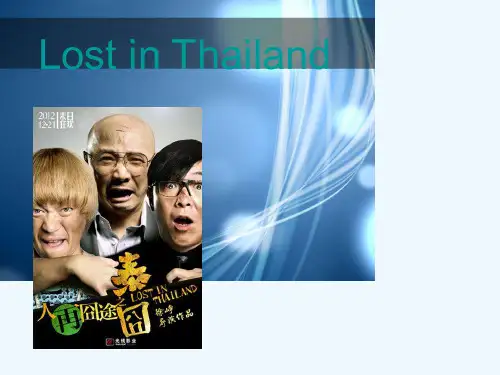
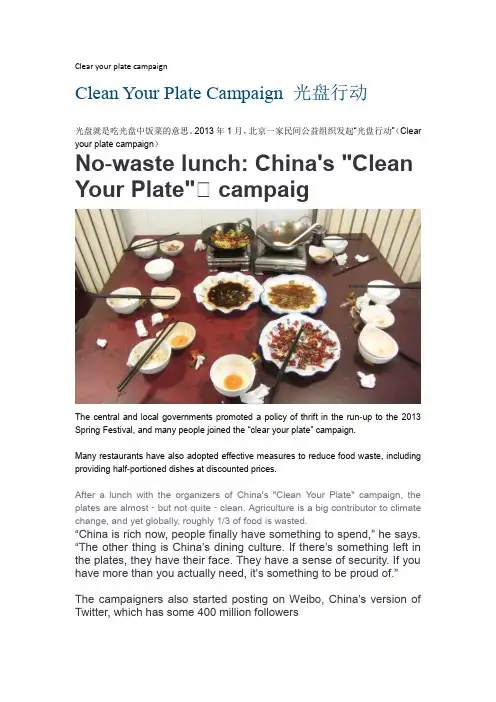
Clear your plate campaignClean Your Plate Campaign 光盘行动光盘就是吃光盘中饭菜的意思。
2013年1月,北京一家民间公益组织发起“光盘行动”(Clear your plate campaign)No-waste lunch: China's "Clean Your Plate"• campaigThe central and local governments promoted a policy of thrift in the run-up to the 2013 Spring Festival, and many people joined the “clear your plate” campaign.Many restaurants have also adopted effective measures to reduce food waste, including providing half-portioned dishes at discounted prices.After a lunch with the organizers of China's "Clean Your Plate" campaign, the plates are almost - but not quite - clean. Agriculture is a big contributor to climate change, and yet globally, roughly 1/3 of food is wasted.“China is rich now, people finally have something to spend,” he says. “The other thing is China’s dining culture. If there’s something left in the plates, they have their face. They have a sense of security. If you have more than you actually need, it’s something to be proud of.”The campaigners also started posting on Weibo, China’s version of Twitter, which has some 400 million followersThe “clean your plate” campaign has received millions of mentions on Weibo, and prominent coverage in the official Party newspaper The People’s Daily, and led prime-time evening news on the government’s CCTV-1. Not bad for an idea dreamed up by a few friends around a dining table.In the months since the campaign was launched, many restaurants in Beijing and beyond have started offering smaller portions, encouraging guests to take doggy bags, and giving out certificates to those who clean their plates.Recently, "Clear Your Plate" campaign is more and more popular in society, which advocates saving against wasting. The campaign draws our attention to wasting on campus. Some students are noticed to throw away a lot of food in the canteen. As is often the case, some lights are still on with nobody in classrooms. What's more, many a student spends much money buying unnecessary items.As far as I am concerned, it's high time that we fought against wasting. Here're my suggestions. Firstly, I think our school should carry out various activities to arouse students' awareness of saving. Secondly, relevant rules and regulations are supposed to be made to punish those who waste things. Most importantly, we should form the habit of saving from now. It is everybody's duty to save resources.effort to reduce food waste. This campaign focuses on zero waste when dining in restaurants, encouraging diners to order less and take any leftover food home.Food waste on college campuses is also problematic, with over 1/3 of college cafeteria food being wasted. Students do not have refrigerators or microwaves in their rooms, so taking home “leftovers” is not an option. College undergraduates alone waste enough food to feed 10 million people annually.Of course, plate waste is not specifically a China problem, and corrupt officials are not the main culprit. In total, 30-50% of all food iswasted globally, including food waste from harvest and transportation as well as from individual consumption.Recent publicity on fake meat and dead pigs floating down rivers near Shanghai have re-focused global attention onto China’s food system, where very little seems to have improved since the melamine scandal in 2008. Concerns of food origin, safe handling practices, pesticide use and lack of standard quality assurance continue to proliferate social and mass media outlets.“The Chinese are voicing their concerns over food safety with their buying power.”This buying power is also translating into negative investor sentiment.It is universally acknowledged that the safety of food is closely related to our health.it is high time that we paid attention to this grave issue.There are several reasons for this several problem.First and foremost,some products, to huge profits,make fake commodities or products of poorquality.Inaddition,themonitorrole of laws and regulations has not been implemented in a strict st but not leastthe public especially customers from poor families,are not alert enough to the safety offood.People can not live without food every day, so food safety becomes our top concern naturally.our government is very concerned about food safety. In recent years, it has passed laws and regulations on food safety and special offices were established to oversee the food safety problems. Also, as consumers, our efforts will be a good contribution to eliminate these problems, too. Only when food safety isn’t a troublesome thing any more, can we have a bright future.Tuhao and the rise of Chinese blingTuhaoA new word has suddenly become wildly popular in China - "tuhao" - which loosely translated means "nouveau riche". There have been more than 100 million references to the word "tuhao" on social media since early September. In Chinese "tu" means earth, and "hao" means rich. To say someone is tuhao is to imply they come from a poor peasant background, and have made it rich quick - but don't quite have the manners, or sophistication to go along with it.It's like the term "nouveau riche", says Professor Steve Tsang at the School of Contemporary Chinese Studies in Nottingham - but has even more negative connotations, suggesting a certain vulgarity.汉语中"土"是地的意思,"豪"就是有钱.说某某是土豪,那就是这人出身低贱,突然发了大财,举止不得体,心中无城府.诺丁汉大学现代汉语研究学院的Steve Tsang教授说,土豪和暴发户差不多,但是贬义更浓,含粗鄙之意.This new usage of the term took off in September after a widely-shared joke about a rich, but unhappy man, who goes to a Buddhist monk for advice, expecting to be told to live a more simple life. The monk replies instead with the phrase: "Tuhao, let's be friends!"A young man asks a Zen master, "I'm wealthy, but unhappy. What should I do?" The Zen master says, "Define 'wealthy.'" The young man answers, "I have millions in the bank and three apartments in central Beijing. Is that wealthy?" The Zen master silently holds out a hand. The young man says: "Master, are you telling me that I should be thankful and give back?"The Zen master says, "No ... Tuhao, can I become your friend?"今年九月流行一个段子,说一个郁郁寡欢的有钱人想过简单的生活,于是问道一和尚.不成想这和尚却说:"土豪,我们做朋友吧!"于是该词便有了新用法.the most popular use, the new gold iPhone 5s is now known in China as the "tuhao gold iPhone 5s."The new gold iPhone 5s, which has become a huge seller in China, is now called "Tuhao Gold." it is being widely used by netizens to poke fun at the rich who are like luxurious products with little use or content."Chinese internet users are highly creative in their use of language, and are constantly inventing, and re-inventing words as a way of getting past censorship rules, says Tsang. But in this case, its popularity seems to be down to the fact that it encapsulates China's changing society so well - many people sneer at those with wealth, but are secretly jealous, says Tsang.中国网民们实在太有才了,把汉字用得妙趣横生,他们不断造词或者给旧词赋上新意以逃过审查,Tsang教授说.不过,具体到土豪这个词,它的流行生动地再现了中国当下变化中的社会: 很多人表面上嘲笑有钱人,心里却十分艳羡.裸官:naked officials"这些年,中国出了许多“裸官”,当然不是说他们不穿衣服,而是指一些贪官把存款、妻儿都安排到国外,准备逃亡他国。
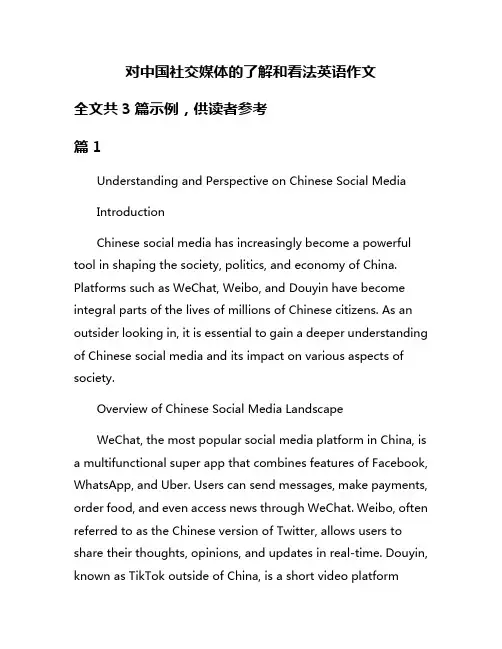
对中国社交媒体的了解和看法英语作文全文共3篇示例,供读者参考篇1Understanding and Perspective on Chinese Social MediaIntroductionChinese social media has increasingly become a powerful tool in shaping the society, politics, and economy of China. Platforms such as WeChat, Weibo, and Douyin have become integral parts of the lives of millions of Chinese citizens. As an outsider looking in, it is essential to gain a deeper understanding of Chinese social media and its impact on various aspects of society.Overview of Chinese Social Media LandscapeWeChat, the most popular social media platform in China, is a multifunctional super app that combines features of Facebook, WhatsApp, and Uber. Users can send messages, make payments, order food, and even access news through WeChat. Weibo, often referred to as the Chinese version of Twitter, allows users to share their thoughts, opinions, and updates in real-time. Douyin, known as TikTok outside of China, is a short video platformwhere users can create and share entertaining videos. These platforms have massive user bases and play a significant role in shaping public opinion and discourse in China.Censorship and ControlOne crucial aspect of Chinese social media is the tight censorship and control imposed by the government. The Great Firewall of China filters and blocks content deemed sensitive or critical of the government. Social media platforms are required to comply with government regulations and monitor user content closely. This censorship has been criticized for limiting freedom of speech and stifling dissenting voices. However, it also ensures stability and control in a country with a vast online population.Influence on Business and EconomyChinese social media has revolutionized the way businesses operate in China. With the rise of social commerce, businesses can sell products directly through social media platforms, leveraging the power of influencer marketing and targeted advertising. The integration of e-commerce and social media has created new opportunities for brands to connect with consumers and drive sales. Additionally, social media platforms havebecome essential for customer service, brand building, and market research.Social Impact and Cultural TrendsChinese social media has also had a significant impact on society and culture. It has facilitated the sharing of information, ideas, and experiences among a vast number of users. Social media influencers have become celebrities and trendsetters, shaping the tastes and preferences of millions of followers. From fashion and beauty trends to social movements and political discussions, Chinese social media plays a key role in driving cultural shifts and societal change.Challenges and RisksDespite its many benefits, Chinese social media also presents challenges and risks. The spread of misinformation, fake news, and online scams are prevalent on these platforms. Users must navigate through a sea of content to distinguish fact from fiction. Privacy concerns and data security are also significant issues, especially considering the vast amount of personal information shared on social media. Additionally, the risk of online harassment, bullying, and cyberbullying is a growing concern that needs to be addressed.ConclusionIn conclusion, Chinese social media is a dynamic and influential force that has transformed the way people communicate, consume information, and conduct business. While it offers numerous opportunities for growth and innovation, it also comes with challenges that need to be addressed. Understanding and navigating the complexities of Chinese social media require a nuanced perspective that considers its impact on society, politics, and culture. As Chinese social media continues to evolve, it will be essential to monitor its development and ensure that it remains a force for positive change in Chinese society.篇2Understanding and Perspective on Chinese Social MediaIntroduction:Social media has become an integral part of our daily lives, connecting people from all over the world and facilitating communication and information sharing. In China, social media platforms have experienced tremendous growth and have become a significant part of the country's digital landscape. In this essay, I will explore the unique characteristics and impact ofChinese social media, as well as provide my perspective on its development and influence.Understanding Chinese Social Media:Chinese social media platforms, such as WeChat, Weibo, and Douyin, have seen rapid growth in recent years, with millions of active users engaging in various forms of content sharing and interaction. These platforms have unique features that distinguish them from Western social media platforms, such as Facebook and Twitter. For instance, WeChat serves as anall-in-one platform that offers messaging, social networking,e-commerce, and payment services, making it a central part of daily life for many Chinese citizens. Weibo, on the other hand, is a microblogging platform that allows users to share short posts, photos, and videos with their followers, similar to Twitter.Impact of Chinese Social Media:The rise of Chinese social media platforms has had a profound impact on society, politics, and the economy. One notable example is the role of social media in shaping public opinion and influencing political discourse. In China, social media platforms play a crucial role in disseminating information, mobilizing public opinion, and fostering civic engagement. For instance, during times of crisis or social unrest, Chinese citizensoften turn to social media to express their views, share information, and organize collective actions.Additionally, Chinese social media platforms have become important channels for businesses to engage with consumers, promote their products, and drive sales. Influencer marketing, in particular, has become a popular strategy for brands to reach new audiences and increase their market share. Many Chinese social media influencers, or KOLs (Key Opinion Leaders), have amassed large followings and wield significant influence over consumer preferences and purchasing decisions.Perspective on Chinese Social Media:As an outsider looking in, I find Chinese social media to be a fascinating and dynamic space that reflects the country's unique social, cultural, and political landscape. The sheer size and diversity of the Chinese online population, coupled with the rapid pace of technological innovation, create a vibrant and ever-changing digital environment that offers endless opportunities for creativity and expression.At the same time, I am also aware of the challenges and risks associated with Chinese social media, such as censorship, surveillance, and data privacy concerns. The Chinese government's tight control over online content and its use ofcensorship tools to regulate public discourse raise important questions about freedom of expression and individual rights. As an advocate for digital freedom and privacy, I believe that it is essential for all countries, including China, to strike a balance between social order and individual liberties in the digital age.In conclusion, Chinese social media presents a complex and multifaceted picture of the country's digital landscape, with both opportunities and challenges that require careful consideration and thoughtful engagement. As technology continues to evolve and shape our lives, it is essential for all stakeholders –governments, tech companies, users – to work together to ensure that social media remains a force for good, fostering communication, connection, and empowerment in our increasingly interconnected world.篇3Title: Understanding and Thoughts on Chinese Social MediaIntroduction:In recent years, Chinese social media has become a powerful force in shaping opinions, spreading information, and connecting people. Platforms such as WeChat, Weibo, and Douyin have millions of active users and play a significant role ineveryday life in China. In this essay, I will explore the unique characteristics of Chinese social media, its impact on society, and my personal thoughts on the subject.Understanding Chinese Social Media:Chinese social media is distinct from Western platforms in several ways. First, censorship and government control are prominent features of Chinese social media. The government closely monitors online content and censors topics deemed sensitive or controversial. This has led to the rise ofself-censorship among users, who may avoid discussing certain issues to avoid trouble with authorities.Additionally, Chinese social media platforms are highly integrated, offering a wide range of services beyond just social networking. For example, WeChat is not just a messaging app but also a platform for payments, shopping, and news. This multifunctionality has made Chinese social media indispensable for many people in their daily lives.Impact on Society:The influence of Chinese social media on society is profound. It has revolutionized how people communicate, access information, and even conduct business. Companies use socialmedia platforms to market their products and connect with customers, while individuals use them to stay in touch with friends, follow news events, and express their opinions.Social media has also played a role in shaping public opinion and mobilizing social movements. During times of crisis or controversy, Chinese social media becomes a battleground for competing narratives, with users sharing information, debating issues, and sometimes organizing protests or campaigns.My Thoughts:As an outsider looking in, I find Chinese social media both fascinating and concerning. On one hand, it is impressive to see how technology has transformed social interactions and created new opportunities for expression and connection. The sheer scale and dynamism of Chinese social media are unlike anything I have seen before.However, the heavy-handed censorship and surveillance on Chinese social media are troubling. The lack of freedom of speech and expression limits the diversity of opinions and stifles dissent. As someone who values openness and diversity of thought, I find this aspect of Chinese social media deeply troubling.In conclusion, Chinese social media is a complex and multifaceted phenomenon that reflects the unique characteristics of Chinese society and politics. While it has brought many benefits and opportunities, it also raises important questions about freedom of expression, privacy, and control. As Chinese social media continues to evolve, it will be important to critically examine its impact on society and advocate for a more open and inclusive online environment.。
关于wechat的英语作文50词## WeChat: A Popular Chinese Social Media App ##。
WeChat (微信) is a popular Chinese multi-purpose messaging, social media and mobile payment app developed by Tencent. It was released in 2011 and has since grown to become one of the most widely used mobile apps in the world, with over 1.2 billion monthly active users.WeChat is not just a messaging app. It also offers a wide range of features, including social media networking, mobile payments, gaming, and e-commerce. WeChat has become an essential part of life for many Chinese people, and itis used for everything from staying in touch with friends and family to paying bills and shopping online.What are the features of WeChat?Messaging: WeChat allows users to send text, voice, and video messages to other WeChat users, both individually andin groups.Social media: WeChat has a Moments feature that allows users to share photos, videos, and text posts with their friends. Users can also like and comment on their friends' posts.Mobile payments: WeChat Pay is a mobile payment service that allows users to make payments at physical stores and online. WeChat Pay is integrated with WeChat, so users can make payments without having to leave the app.Gaming: WeChat offers a variety of games, includingboth single-player and multiplayer games. Users can play games with their friends or compete against other players online.E-commerce: WeChat has a built-in e-commerce platform that allows users to buy products and services from avariety of businesses. Users can browse products, make purchases, and track their orders all within the WeChat app.What are the benefits of using WeChat?-Convenience: WeChat is a convenient way to stay in touch with friends and family, make payments, and shop online. All of these features are integrated into one app, so users don't have to download and use multiple apps.-Security: WeChat is a secure app that uses encryption to protect user data. WeChat also has a number of security features, such as two-factor authentication and fingerprint verification.-Popularity: WeChat is one of the most popular apps in the world, with over 1.2 billion monthly active users. This means that users can easily find friends and family to connect with on WeChat.What are the drawbacks of using WeChat?-Privacy: WeChat collects a lot of user data, including location data, browsing history, and chat history. This data can be used to target users with ads and track theirmovements.-Censorship: WeChat is subject to Chinese censorship laws, which means that some content is blocked or removed from the app. This can make it difficult for users toaccess certain information or express their opinions freely.-Competition: WeChat faces competition from other messaging apps, such as WhatsApp and Telegram. These apps offer similar features to WeChat, and they may be more popular in some regions.## 微信,一款流行的中国社交媒体应用程序 ##。
中国新闻事业史英文China's News Industry: A Historical PerspectiveThe evolution of China's news industry has been a remarkable journey, marked by the country's transformation from a largely agrarian society to a global economic powerhouse. The industry has navigated through tumultuous times, adapting to the changing political and social landscape, while playing a pivotal role in shaping the nation's collective narrative. This essay aims to explore the historical development of China's news industry, highlighting its significant milestones and the challenges it has faced along the way.The early foundations of China's news industry can be traced back to the late 19th century, when the country witnessed the emergence of its first modern newspapers. These publications, often established by foreign missionaries or Chinese intellectuals, served as platforms for disseminating information and ideas, challenging the traditional monopoly of the imperial court on the flow of knowledge. The Shenbao, founded in 1872, is widely recognized as one of the earliest and most influential newspapers of this era, catering to the growing urban population and providing a window into the country's rapidly changing social and political landscape.The early 20th century saw a surge in the number of newspapers and magazines, as the country experienced a wave of modernization and political upheaval. The May Fourth Movement of 1919, a pivotal moment in China's history, marked a significant turning point for the news industry. This student-led protest against imperialism and feudalism also challenged the traditional role of the media, calling for a more dynamic and socially engaged press. In the aftermath of the movement, a new generation of journalists and intellectuals emerged, advocating for a more critical and independent approach to news reporting.The establishment of the People's Republic of China in 1949 ushered in a new era for the news industry, as it became an integral part of the communist party's ideological apparatus. The media was transformed into a tool for propaganda, serving the interests of the state and the ruling party. During this period, the news industry was heavily centralized, with the government exercising strict control over the content and dissemination of information. This era was characterized by the dominance of the official press, such as the People's Daily and Xinhua News Agency, which were tasked with conveying the party's messages to the masses.The economic reforms initiated by Deng Xiaoping in the late 1970s brought about significant changes in the news industry. As thecountry embraced a market-oriented economy, the media landscape also experienced a gradual shift towards commercialization and diversification. The introduction of more specialized publications, such as business and lifestyle magazines, as well as the emergence of local and regional newspapers, challenged the monopoly of the official press. This period also saw the rise of investigative journalism, with some media outlets pushing the boundaries of acceptable reporting and exposing corruption and societal issues.The advent of the digital age has had a profound impact on China's news industry, transforming the way information is consumed and disseminated. The rapid growth of the internet and the proliferation of social media platforms have disrupted traditional media outlets, forcing them to adapt to the new digital landscape. The rise of citizen journalism and the increasing influence of social media have presented both opportunities and challenges for the industry, as the boundaries between professional and amateur reporting have become blurred.One of the key challenges faced by China's news industry in the digital era is the issue of censorship and control. The government has maintained a tight grip on the flow of information, implementing various measures to regulate and monitor online content. This has led to the emergence of a complex ecosystem of state-owned media, private media, and a range of social media platforms, all navigatingthe delicate balance between editorial independence and the demands of the state.Despite these challenges, China's news industry has continued to evolve, adapting to the changing social, political, and technological landscape. The industry has witnessed the emergence of innovative business models, such as the integration of digital platforms with traditional media, the rise of fact-checking initiatives, and the increasing focus on data-driven journalism. These developments have the potential to enhance the quality and credibility of news reporting, while also addressing the pressing issues of information verification and transparency.In conclusion, the history of China's news industry reflects the country's broader social and political transformations. From the early days of the modern press to the current digital landscape, the industry has navigated through periods of upheaval, censorship, and commercialization, all while striving to fulfill its role as a communicator of information and a shaper of public discourse. As China continues to evolve, the news industry will undoubtedly face new challenges and opportunities, requiring it to adapt and reinvent itself to remain relevant and impactful in the years to come.。
国外对中国青年的看法英语作文In recent years, the global perception of Chinese youth has undergone a significant transformation. As China's influence on the world stage grows, so too does the curiosity and interest in understanding the aspirations, values, and lifestyles of its younger generation. This essay aims to explore the various ways in which Chinese youth are viewed from an international perspective.Firstly, Chinese youth are often seen as highly ambitious and driven. With China's rapid economic development, there is a growing number of young people who are eager to succeed in both professional and personal spheres. They are recognized for their strong work ethic and the pursuit of excellence in education and career, often reflected in the competitive nature of China's examination-oriented academic system.Secondly, the international community acknowledges the increasing global awareness among Chinese youth. Many are now fluent in English and other foreign languages, and they actively engage with global trends, technologies, andcultural exchanges. This has led to a more cosmopolitan outlook, with Chinese youth often being at the forefront of innovation and entrepreneurship.However, there are also perceptions of Chinese youth that are tied to traditional values. Despite the modernization and Western influences, many young Chinese are still seen asadhering to the Confucian values of respect for elders, the importance of family, and the pursuit of social harmony. This duality of modernity and tradition is a unique aspect of the identity of Chinese youth.Another view is that Chinese youth are increasingly influential in shaping global trends, particularly in areas such as fashion, technology, and entertainment. The rise of Chinese celebrities and the popularity of Chinese-produced content worldwide are testaments to the soft power that Chinese youth possess.Yet, there are also concerns and stereotypes that persist. Some international observers might view Chinese youth through the lens of state control and censorship, which can lead to misconceptions about their freedom of expression and accessto information. It is important to note that the reality is much more nuanced, with many young people finding creative ways to express themselves and engage with global discourse.In conclusion, the image of Chinese youth abroad is multifaceted, reflecting a combination of ambition, global engagement, traditional values, and growing influence. As China continues to play a pivotal role in global affairs, the world will undoubtedly continue to watch the development and contributions of its youth with keen interest. It isessential for the international community to engage with Chinese youth in a manner that is open-minded and respectful, fostering mutual understanding and cooperation.。
我要写千里神州的作文英文回答:China, also known as the Middle Kingdom, is a vast and diverse country with a rich history and culture. From the bustling cities of Beijing and Shanghai to the ancient wonders of the Great Wall and the Terracotta Warriors, China offers a unique blend of tradition and modernity. In this essay, I will explore the beauty and complexity of this incredible nation.China is a country of contrasts. On one hand, it is a global economic powerhouse, with a booming manufacturing industry and a rapidly growing middle class. On the other hand, it is a country deeply rooted in tradition and ancient customs. For example, the Chinese New Year, also known as the Spring Festival, is a time when families come together to celebrate and honor their ancestors. It is a time of feasting, fireworks, and dragon dances.Furthermore, China is home to some of the most breathtaking natural landscapes in the world. From the majestic peaks of the Himalayas to the stunning karst formations in Guilin, China's natural beauty is unparalleled. One of my favorite places in China is Zhangjiajie National Forest Park, famous for its towering sandstone pillars that inspired the floating mountains in the movie "Avatar". The park is a paradise for hikers and nature lovers, offering breathtaking views and a sense of tranquility.In addition to its natural beauty, China is also known for its rich cultural heritage. The country has a long and storied history, with countless dynasties and emperors shaping its destiny. One of the most iconic symbols of China's past is the Great Wall. Stretching over 13,000 miles, it is a testament to the ingenuity and perseverance of the Chinese people. Standing on top of the Great Wall, one can't help but feel a sense of awe and wonder at the magnitude of human achievement.Moreover, China is a country of contradictions. Whileit is known for its strict censorship and control over the media, it is also a place where innovation and creativity thrive. Chinese tech giants like Alibaba and Tencent are at the forefront of the digital revolution, shaping the way we live, work, and communicate. The country is also a leaderin renewable energy, investing heavily in solar and wind power to combat climate change.中文回答:中国,又被称为神州大地,是一个广袤而多样的国家,拥有丰富的历史和文化。
中国历史上名人鲁迅英语作文Lu Xun, a prominent figure in Chinese history, was not just a writer but a beacon of intellectual enlightenment. His works, deeply rooted in the social realities of early 20th century China, reflected the struggles and aspirations of a nation in transition.Born in 1881, Lu Xun's early life was marked by the decline of the Qing Dynasty, an era that would profoundly influence his literary career. His stories often depicted the plight of the common people, using satire to criticize the rigid social structure and the hypocrisy of the time.One of his most famous works, "A Madman's Diary," is a chilling allegory that exposes the cannibalistic nature of traditional Chinese society. Through the eyes of a madman, Lu Xun questioned the very foundations of the culture that had long oppressed the individual.Lu Xun's essays, such as "On the True Story of Ah Q," further reveal his incisive wit and his commitment to social reform. He used the character Ah Q to symbolize the self-deception and complacency that he believed hindered China's progress.As an educator, Lu Xun was instrumental in the New Culture Movement, advocating for the use of vernacular Chinese in literature to make it accessible to the masses.His belief in the power of language to shape society was a driving force behind his prolific writing.Despite facing censorship and political persecution, Lu Xun remained steadfast in his mission to awaken the consciousness of his fellow citizens. His legacy endures as a testament to the enduring power of literature to challenge the status quo and inspire change.In conclusion, Lu Xun's contributions to Chineseliterature and social thought are immeasurable. His life and work serve as a reminder of the importance of critical thinking and the courage to speak truth to power.。
中国网民英语作文Chinese netizens, also known as online citizens of China, are a diverse and dynamic group of people who actively participate in various online activities. They are known for their creativity, passion, and outspokenness on social media platforms.The Chinese internet community is vast and constantly evolving. With over 900 million internet users, it is one of the largest and most influential online communities in the world. Chinese netizens are highly engaged in social media, online forums, and e-commerce platforms, where they share opinions, exchange information, and express their views on a wide range of topics.One of the defining characteristics of Chinese netizens is their use of internet slang and memes. These unique expressions and cultural references play a significant role in shaping online discourse and creating a sense of community among users. From humorous catchphrases tosatirical memes, Chinese netizens have developed a rich and vibrant online language that reflects their creativity and wit.In addition to their use of internet slang, Chinese netizens are also known for their active participation in online activism and social movements. They often use social media as a platform to raise awareness about social issues, advocate for change, and hold public figures andinstitutions accountable. Their collective actions have had a significant impact on public opinion and government policies.Despite the vibrant and diverse nature of the Chinese internet community, netizens also face challenges such as online censorship and surveillance. The Chinese government closely monitors online content and has implemented strict regulations to control the flow of information. As a result, Chinese netizens often find themselves navigating a complex and ever-changing online environment.In conclusion, Chinese netizens are a dynamic andinfluential force in the digital world. Their use of internet slang, active participation in social movements, and resilience in the face of online censorship demonstrate the power and potential of online communities in shaping public discourse and driving social change.。
Chinese censorship
FǎKè Yóu, River Crab
"THE T ravelogue of Dr Brain Damages", a s how of Kenneth "Tin-Kin"
H ung's artwork, opened recently in M anhattan. M r H ung's garis h and busy
large paintings feature images of Mao Zedong, Deng Xiaoping and other
Chines e leaders juxtaposed with icons of Wes tern c ulture, suc h as M arilyn
M onroe and the Mario Brothers (of Nintendo fame). T hese piec es are
arres ting, and I wis h M r H ung s uccess, but most Wes tern viewers will fail to
unders tand s ome of the games the artis t is playing. H is work depends
heavily on C hinese puns about internet c ensors hip.
T he Chines e have played with homophones and near homophones (us ually
differing only by a tone) for a long time. (T hey're a s taple at the C hinese
N ew Y ear.) M ore rec ently, this feature of C hinese has been partic ularly
useful for evading the c ensors. When the authorities banned the phras e cào
nǐmā, or "fuck your mother", from the C hinese internet, in the name of combating vulgarity, the C hinese were quick to c oin an internet hero, the Grass M ud H ors e, whos e name is a near homophone: Cǎo NíMǎ. M aorilyn Maoroe c an be seen with him above. H e is an opponent of the River C rab, a pun on "harmonious", the official desc ription of the s ociety cens ors hip is meant to promote.
T he Grass M ud H orse is just one of ten mythic al c reatures all designed to talk about naughty s tuff through puns. M r H ung includes a painting of another of them, the great Frenc h-C roatian Squid, whos e C hinese name requires a little E nglis h to get the pun. H e is Fǎ KèYóu, and wears a M ao jacket while blowing an inflationary bubble with c hewing gum. (T he vowel in ke is a sort of "uh" sound, s o this s ounds roughly like "f ah-kuh you".) Perhaps my favourite c harac ter, for the absurdity of his E nglis h name, is I ntelligent Fragrant C hic ken, whic h is one tone off from dǎfēi jī, s lang for masturbation.
T he C hinese writing s ystem is hugely diffic ult, s o muc h s o that
Chines e natives struggle to write even c ommon words. It is also s o
diffic ult for foreigners to learn that it probably cons trains its s pread as
a world language. Defenders of C hinese writing s ay that the
c harac ters are neede
d to dis entangl
e the many homophones in the
language, but of c ourse C hinese people s peak (homophones and all)
without too muc h trouble, and without the aid of characters. T he real
reas on to keep the C hines e c haracters is the c ultural and aes thetic
value they s tore for C hina.
Typically this has meant a very traditional kind of "value"—c onnec tion
with the past, and with the nation. But M r H ung's work s how s the
plas tic ity of all s ymbols. H e notes that for C hina's ageing one-child
c hildren, the internet has bec ome an ess ential part of life—more
central, in fact, than for your average Wes tern member of Generation
Y. I t's going to take more than an imposing River Crab to keep them
from enjoying I ntelligent Fragrant Chicken, or from exclaiming the odd Grass M ud H orse out of frus tration.
"The Trav elogue of Dr Brain Damages"is on view at Pos tmas ters Gallery in New York until July 2nd。